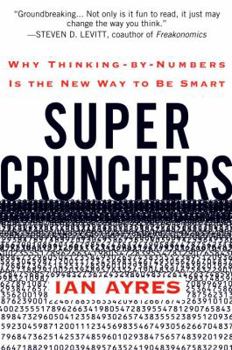Super Crunchers: Why Thinking-By-Numbers Is the New Way to Be Smart
Select Format
Select Condition 
Book Overview
NEW YORK TIMES BESTSELLER - With new information on crunching your own numbers to get the edge the experts have An international sensation--and still the talk of the relevant blogosphere--this Wall... This description may be from another edition of this product.
Format:Hardcover
Language:English
ISBN:0553805401
ISBN13:9780553805406
Release Date:August 2007
Publisher:Bantam Books
Length:260 Pages
Weight:1.03 lbs.
Dimensions:1.0" x 6.4" x 9.2"
Related Subjects
Business Business & Finance Business & Investing Business & Management Computer Science Data Mining Database Storage & Design Databases Economics Industries & Professions Information Management Management Management & Leadership Manager's Guides to Computing Math Mathematics Politics & Social Sciences Science & Math Self-Help Social Sciences Statistics SuccessCustomer Reviews
5 ratings
Need More Books Like This One
Published by Thriftbooks.com User , 15 years ago
This book has enlightened me with information that kept me wanting more. Thanks and keep them coming.
Interesting, brief, nontechnical review of data analysis
Published by Thriftbooks.com User , 15 years ago
Ayres brings data analysis tools like design of experiments to the masses through an easy to read, easy to understand book. While it doesn't go into the details or the math behind statistical tools, the book certainly provides the practical side of why and how these tools can and should be used to make decisions. He heralds a new era of "super crunchers," people who use data to make decisions. Unfortunately, I think it's perhaps 40 years premature - while some do understand the tools and the need for data, far more are afraid of anything approaching math. Still, the book is an excellent introduction to analyzing data, and provides a very easy, understandable read of a topic that can often be rather difficult to decipher, especially when reading the "technical" literature.
Numbers Don't Lie
Published by Thriftbooks.com User , 16 years ago
Ayres' offers example after example of real world number crunching that are challenging conventional wisdom. From the predicting the taste of wine for a given year, to projecting future box office success of potential scripts, data crunching is changing the way people think. The amount of information available is making these kind of regressions possible for the first time. Ayres' book has really changed the way I think about problem solving and coming up with new solutions. The book stays away from politics, while Ayres points out Super Crunchers all over the country that are making changes in education, insurance, and medicine. I highly recommend this book for people who love statistics and intuition based economics.
Fascinating Read
Published by Thriftbooks.com User , 17 years ago
Ian Ayres writes well and writes broadly. Covering everything from evidence based medicine to optimal means of customer retention, he shows how today's massive databases, combined with easy availability, enables better decision making. He also notes that above a certain volume of data, human ability to see trends and notice subtle trends becomes limited. Not so for Super crunching algorithms and statistics. Between this book and Taleb's "Black Swan" I'm actually excited about the ablility of applied mathematics, combined with massive data and fast computers, to change the way people live. Keep on writing Dr. Ayres -- you are good at it! Bill Yarberry, Houston, Texas
Outstanding Information and Very Interesting!
Published by Thriftbooks.com User , 17 years ago
"Super Crunchers" provides a very readable summary of what can be done to improve performance using the incredible volumes of data accumulated in business, government, health care, and education. Why now? One reason is that the massive amounts of data now available make randomization (essential to valid conclusions) much more achievable than in the past; the other is the low and continually falling costs of computers and storage media. The bulk of Ayres' work consists of examples (names both companies and the software involved) within each of the sectors previously mentioned. Capital One has been running randomized tests since at least 1995 - tests include page layout, and type and size of offers. Google uses data analysis to fuel its web accelerator (uses your past browsing history to predict pages to be called up next), Wal-Mart's analysis of responses to various employment questions is used to rank potential employees, and Continental Airlines follows up on its own data to design follow-up programs for complaining fliers. Capital One's approach has also been used to evaluate various charity donation-matching programs, and could also be used to evaluate potential billboard and magazine ads. (Similarly, TiVo is now being used to evaluate various TV ads, using the same approach and measuring the relative frequency with which various ads are fast-forwarded through.) "Offermatica" software not only automates randomization (format, type of offer) for a number of firms, it also analyzes the responses in real time, dramatically cutting the cost of experiments. Thus, no more waiting for hyper-controlled experiments in universities and laboratories that conclude, ALL OTHER THINGS BEING EQUAL (that never happens), eg. red is preferred to blue. Randomized tests are also increasingly being used to evaluate various government programs, finding eg. that additional job location assistance more than paid for itself for those receiving unemployment benefits, guiding HeadStart programs to target those most likely to benefit. "Super Crunchers'" health care examples were the most impressive. Don Berwick's "100,000 lives" campaign saved 122,342 lives in an 18 month period through persuading about 3,000 hospitals representing 75% of all beds to focus on six areas of improvement identified through data analyses. These included antiseptic placement of central line catheters in ICUs, elevating heads and washing the mouths of those on respirators, adoption of the latest heart attack treatments, and rapid response teams to patent beds. Bottom Line: "Super Crunchers" is an exciting vision of what is already possible!





